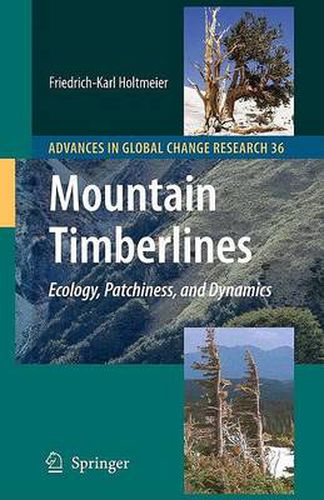Readings Newsletter
Become a Readings Member to make your shopping experience even easier.
Sign in or sign up for free!
You’re not far away from qualifying for FREE standard shipping within Australia
You’ve qualified for FREE standard shipping within Australia
The cart is loading…






This title is printed to order. This book may have been self-published. If so, we cannot guarantee the quality of the content. In the main most books will have gone through the editing process however some may not. We therefore suggest that you be aware of this before ordering this book. If in doubt check either the author or publisher’s details as we are unable to accept any returns unless they are faulty. Please contact us if you have any questions.
For more than 40 years I have been engaged in timberline research. Thus, one could suppose that writing this book should not have been too difficult. It was harder, however, than expected, and in the end I felt that more questions had arisen than could be answered within its pages. Perhaps it would have been easier to write the book 30 years ago and then leave the subject to mature. Lastly it was the late Prof. Heinz Ellenberg who had convinced me to portray a much needed and complete picture of what we know of the timberline with special respect to its great physiognomic, structural and ecological variety. The first version of this book was p- lished in the German language (Holtmeier, 2000). Nevertheless, I was very delighted when Prof. Martin Beniston encouraged me to prepare an English edition for the series ‘Advances in Global Change Research’, which guaranteed a wider circulation. Timberline is a worldwide and very heterogeneous phenomenon, which can only be presented by way of examples. My own field experience is necessarily limited to certain timberline areas, such as the Alps, northern Scandinavia, northern Finland and many high mountain ranges in the western United States and Canada. However, my own observations and the results of my and my previous collaborators research were essential for developing the concept of the book and became integrated into the picture of timberline that is presented in the following chapters.
$9.00 standard shipping within Australia
FREE standard shipping within Australia for orders over $100.00
Express & International shipping calculated at checkout
This title is printed to order. This book may have been self-published. If so, we cannot guarantee the quality of the content. In the main most books will have gone through the editing process however some may not. We therefore suggest that you be aware of this before ordering this book. If in doubt check either the author or publisher’s details as we are unable to accept any returns unless they are faulty. Please contact us if you have any questions.
For more than 40 years I have been engaged in timberline research. Thus, one could suppose that writing this book should not have been too difficult. It was harder, however, than expected, and in the end I felt that more questions had arisen than could be answered within its pages. Perhaps it would have been easier to write the book 30 years ago and then leave the subject to mature. Lastly it was the late Prof. Heinz Ellenberg who had convinced me to portray a much needed and complete picture of what we know of the timberline with special respect to its great physiognomic, structural and ecological variety. The first version of this book was p- lished in the German language (Holtmeier, 2000). Nevertheless, I was very delighted when Prof. Martin Beniston encouraged me to prepare an English edition for the series ‘Advances in Global Change Research’, which guaranteed a wider circulation. Timberline is a worldwide and very heterogeneous phenomenon, which can only be presented by way of examples. My own field experience is necessarily limited to certain timberline areas, such as the Alps, northern Scandinavia, northern Finland and many high mountain ranges in the western United States and Canada. However, my own observations and the results of my and my previous collaborators research were essential for developing the concept of the book and became integrated into the picture of timberline that is presented in the following chapters.